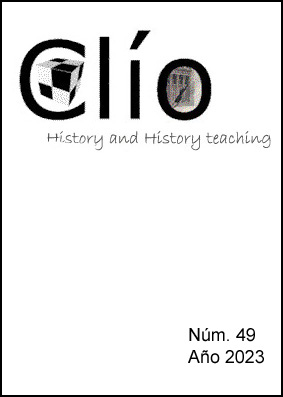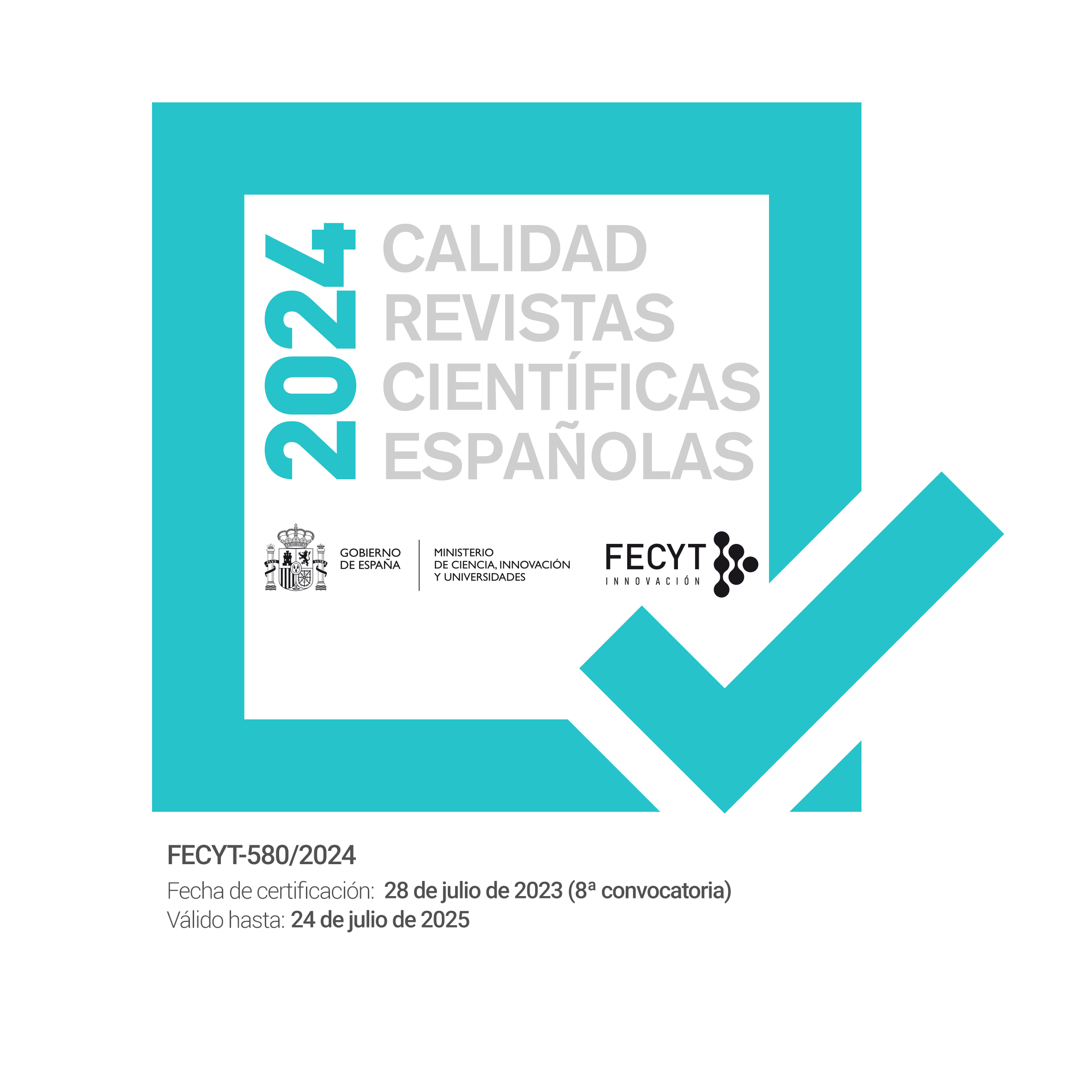Recreación y aprendizaje-servicio en el contexto de la Guerra Civil española
DOI:
https://doi.org/10.26754/ojs_clio/clio.2023499521Palabras clave:
Guerra Civil española, recreación, aprendizaje-servicio, Patrimonio, memoria historicaResumen
La recreación histórica es una práctica social emergente en la sociedad del conocimiento y nos ayuda a comprender mejor aspectos del pasado y el patrimonio. El conocimiento adquirido a través de la recreación histórica contribuye en la construcción de una ciudadanía de calidad. La profundización de los valores democráticos requiere que los sistemas educativos se comprometan con la promoción de la ciudadanía crítica. El aprendizaje-servicio desarrolla de manera constructiva experiencias que conectan ciencia, educación y sociedad. Nuestra investigación describe una praxis sistematizada de recreación histórica. Ha sido desarrollada por estudiantes universitarios, y se ha llevado a cabo desde la perspectiva del aprendizaje-servicio, de manera coherente con los conceptos de historia pública y arqueología pública, para contribuir a la promoción y defensa de la historia patrimonial y la preservación de memoria histórica.
Descargas
Referencias
Agnew, V., Lamb, J., & Tomann, J., (2019). The Routledge Handbook of Reenactment Studies: Key Terms in the Field. Rouletge. [Google Scholar]
Arnabat, R., & Hernàndez, F. X. (Coord.) (2011). Estratègies de recerca i transferència del coneixement històric-arqueològic. El cas de l’aviació republicana (1938-1939). Llibres de Matrícula.
Baden-Powell, R. (1908). Scouting for Boys. Horace Cox.
Baden-Powell, R. (1918). Scouting for Girls. Adapted from Girl Guiding. Loose Canon.
Cauvin Th. (2016). Public History: A Textbook of Practice. Rouledge. [Google Scholar]
Demantowsky, M. (2018). Public History and School: International Perspectives. Walter de Gruyter. [Google Scholar]
Dewey, J. (1899). School and society. The middle works of John Dewey (Vol. 1). Southern Illinois University Press, 1-109.
Dewey, J. (1938). Experience and Education. Collier Publications.
Dupré, S., Harris, A., Kursell, J., Lulof, P., & Stols-Witlox, M. (2020). Reconstruction, Replication and Re-enactment in the Humanities and Social Sciences. University Press. [Google Scholar]
Eyler, J., & De Giles, (1999). Where’s the Learning in service-learning? Jossey-Bass. [Google Scholar]
Feliu-Torruella, M. (2011). Viure i morir a la Guerra Civil espanyola 1936-1939: deu anys d’història d’una activitat educativa al Museu d’Història de Catalunya. Ebre 38. Revista internacional de la Guera Civil espanyola (1936-1939), 6, 223-237. [Google Scholar]
Feliu-Torruella, M., & Hernández-Cardona, F. X. (2020). The Spanish Civil War in the Classrooms: Working for Citizenship Education. In E. Delgado Algarra, & J. M. Cuenca López, Handbook of Research on Citizenship and Heritage Education. IGI Global. [Google Scholar]
Fischer, B. (1990). Re-enactment: Between Self and Other. Power Plant.
Flon, E. (2012). Les mises en scène du patrimoine. Savoir, fiction et médiation. Hermès science/Lavoisier. [Google Scholar]
Furco, A., & Billing, S. H. (Ed) (2002). Service Learning: The Essence of the Pedagogie. Greenwich. Information Age Publishing. [Google Scholar]
Hernàndez-Cardona, F.X., Rubio-Campillo, X., Sospedra-Roca, R., & Íñiguez-Gracia, D. (2021). Illustration, Recreación histórica, Citizenship and Heritage of Contemporary Conflict: The Case of the Ebro (1938). Sustainability, 13, 3425. https://doi.org/10.3390/su13063425
Hernàndez-Cardona, F. X., Feliu-Torruella, M., Sospedra-Roca, R., González-Sanz, M., & Wilson-Daily, A. (2019). Generación de iconografía didáctica a partir de recreación histórica y 3D. El caso de la Guerra Civil Española. Ensayos. Revista de la Facultad de Educación de Albacete, 34(1), 67-82. https://doi.org/10.18239/ensayos.v34i1.2034
Hernández, F. X., & Hernàndez-Pongiluppi, M. (2018). Ebre 1938. Imatges d'una batalla. Angle Editorial.
Hernàndez-Cardona, F. X., Íñiguez-Gracia, D., Gesalí-Barrera, D., & Rubio-Campillo, X. (2019). Arqueología, historia y didáctica de la aviación republicana en Cataluña (2001-2018). En A. Pérez-Juez & J. Morin, Arqueología de la Guerra Civil y la Dictadura Española. La historia NO escrita. BAR Publishing. 49-61.
Hernàndez, F. X., & Rojo, M. C. (eds.) (2012). Museografía didáctica e interpretación de espacios arqueológicos. Trea.
Hernàndez-Pongiluppi, M. (2020). Escultures, memòria i didàctica de la Batalla de l’Ebre. Ebre 38. Revista Internacional de la Guerra Civil (1936-1939),10. 123-140. https://doi.org/10.1344/ebre38.2020.10.33679
Íñiguez-Gracia, D., & Hernàndez-Cardona, F. X. (2004). Las guerras del siglo XX en los museos. Iber: Didáctica de las ciencias sociales, geografía e historia, 39. 17-30. [Google Scholar]
Jacoby B. (1996). Service-learning in Higher Education. Concepts and practices. Jossey Bass. [Google Scholar]
Jiménez, L., & Rojo, M. C. (2014). Recreación histórica y didáctica. Íber. Didáctica de las Ciencias Sociales, Geografía e Historia, 78. 35-43. [Google Scholar]
Kilpatrick, W. H. (1918). The project method. The Use of the Purposeful Act in the Educative Process. Teachers College Bulletin. Tenth Series No. 3. October 12, 1918. Teachers College, Columbia University.
González Ruibal, A. (2016). Volver a las trincheras. Una arqueología de la Guerra Civil Española. Alianza editorial.
González Ruibal, A. (2012). El último dia de la batalla del Ebro. Informe de las excavaciones arqueológicas en los restos de la Guerra civil en Raïmats. La Fatarella (Tarragona). CSIC-INCIPT. Informes y documentos de Trabajo.
Goodacre, E. J., y Baldwin, G. (2002). Living the past: reconstruction, recreation, recreación histórica and education at museums and historical sites. Middlesex Press.
Heuvel, L. L. (Ed) (2020). Living History in the Classroom: performance and Pedagogy. Emerald Group Publishing.
Ley 52/2007, de 26 de diciembre, por la que se reconocen y amplían derechos y se establecen medidas en favor de quienes padecieron persecución o violencia durante la guerra civil y la dictadura. Articulo 1, apartado 2. «BOE» núm. 310.
Ley 20/2022, de 19 de octubre, de Memoria Democrática (BOE de 20 de octubre). «BOE» núm. 252.
Paardekooper, R. P., (2013). The Value of an Archaeological Open-Air Museum is in its Use, Sideston. [Google Scholar]
Puig, J. M., Batlle, R., Bosch, C., & Palos, J. (2007). Aprendizaje Servicio Educar para la Ciudadanía. Octaedro.
McCalman I., & Pickering P. (2010). Historical reenactment: from realism to the affective turn. Macmillan. [Google Scholar]
Merriman, N. (2004). Public Archaeology. Routledge.
Morris, R. V. (2009), Bringing History to Life. Firts-Person Historical Presentations in Elementary and Middle School Classrooms. Rowman & Littlefield Publishers, Inc.
Morris, R. V. (2012). History and imagination. Reenactments for Elementary Social Studies. Rowman & Littlefield Publishers, Inc.
Moshenska, G. (Ed). (2017). Key Concepts in Public Archaeology. UCL Press. [Google Scholar]
Muchitsch, W. (2014). Does War Belong in Museums?: The Representation of Violence in Exhibitions. Museumsakademie Joanneum, 4. [Google Scholar]
Schneider, R. (2014). Theatre & History. Macmillan International Higher Education. [Google Scholar]
Sospedra, R., Feliu, M., Wilson, A. E., Sebares, G., & Hernàndez, M. (2018). La batalla de la Fatarella, 1938.
Museografia, iconografia, recreació i memòria. Un model transversal de recerca didàctica. Ebre 38: revista internacional de la Guerra Civil, (1936-1939), 8. 229-242. https://doi.org/10.1344/ebre38.2018.8.22007
Sospedra-Roca, R., Boj-Cullell, I., Castell, J. (2020). El Molar. Museografia didàctica en un hospital de la Batalla de l’Ebre. Ebre 38. Revista internacional de la Guerra Civil (1936-1939), 10. 185-207. https://doi.org/10.1344/ebre38.2020.10.33678
Stone, P. G., & Planel, P. G. (eds). (1999). The Constructed Past. Experimental Archaeology, Education and the Public. Routledge.
Titone, R. (1981). Psicodidáctica. Narcea.
Descargas
Publicado
Número
Sección
Licencia
Derechos de autor 2023 Rafel Sospedra Roca, Paula Jardón Giner, Isabel Boj-Cullell, Francesc Xavier Hernàndez-Cardona

Esta obra está bajo una licencia internacional Creative Commons Atribución-NoComercial-CompartirIgual 4.0.
Este trabajo tiene una licencia internacional Creative Commons Attribution-NonCommercial-ShareAlike 4.0 International License.
Los derechos de autor siguen siendo propiedad de los autores. Se debe obtener permiso de los autores para la reimpresión y el contenido de JoS no se puede copiar con fines comerciales. JoS, sin embargo, se reserva el derecho de reproducción futura de artículos en copia impresa, formato de documento portátil (.pdf) o ediciones HTML de JoS.
Cómo citar
Datos de los fondos
-
Ministerio de Economía y Competitividad
Números de la subvención EDU2012-35299 -
Ministerio de Ciencia e Innovación
Números de la subvención EDU2016-76589 -
Ministerio de Ciencia e Innovación
Números de la subvención PID2020-118615RB-100






